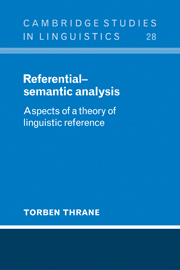CONCLUSION: SUMMARY AND FURTHER PROSPECTS
Published online by Cambridge University Press: 06 August 2010
Summary
My main concern in the present work has been to argue in favour of recognizing a distinction between two equipollent types of linguistic analysis. Of these, the syntactico-semantic analysis is well established and has been throughout the history of linguistics. In contrast, the referential–semantic analysis has received only sporadic and informal treatment, more often than not by philosophers rather than by linguists. Furthermore, when linguists have concerned themselves with the analysis of data that lend themselves to RS-analysis, they have more often than not conducted their enquiries within the framework which is designed to account for SS-phenomena. This has led to a certain amount of inconsistency within the SS-analysis while at the same time complicating the issues unnecessarily.
The area of English nominal composition which has provided data for an empirical assessment of the validity of the theoretical framework established in Part II has been restricted to the area in which the referential functives play a major part. This area is at the same time one of the areas least satisfactorily dealt with by current SS-practice.
Yet it is not only with respect to the referential functives that the referential–semantic theory may contribute with new insights into linguistic structure. Another general area where this type of analysis can reasonably be expected to yield felicitous results comprises many aspects of adjectival constructions. The serialization of attributive adjectives is clearly bound by a system of rules which the SS-analysis has no obvious way of accounting for.
- Type
- Chapter
- Information
- Referential-Semantic AnalysisAspects of a Theory of Linguistic Reference, pp. 238 - 239Publisher: Cambridge University PressPrint publication year: 1980



